#it's like star trek. hi these are my best friends episodes the offspring and data's day
Text
and also late stage holmes canon is like star trek in the way that you'll get stories like "illustrious client" which was so good that when elementary went to adapt it they were like "three of these things (Sherlock Holmes Serious Concussion, Kitty Winter Acid Attacks Her Rapist, and Shinwell Johnson's Whole Thing) are so iconic we have to build an entire season around each of them or, like, "blanched soldier" which has a good mystery, a strong emotional through-line, and a really fun narration gimmick, BUT . then also in between stories like this you get stories like "shoscomb old place" which is just like. mildly bad like it's just not the best mystery, plus a dash of antisemitism, and stuff like "three gables" which is actively offensive in many ways
#it's like star trek. hi these are my best friends episodes the offspring and data's day#and here are my worst enemies up the long ladder and code of honor#the epic highs and dismal lows of late-stage conan doyle career#q#sherlock holmes
14 notes
·
View notes
Text
Character Spotlight: Data
By Ames
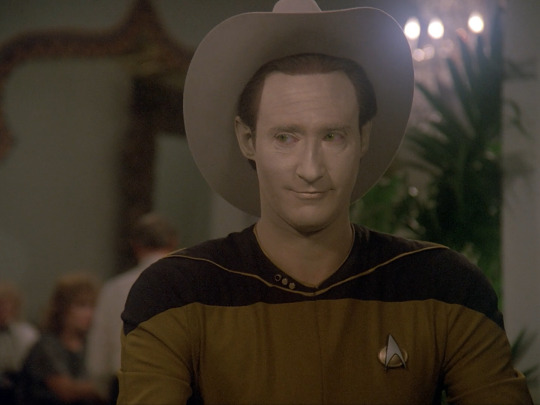
It’s the man you’ve all been waiting for! He’s one of the most popular Star Trek characters of all time. He teaches us humanity and friendship and science. He’s the outsider character of his series and uses his unique perspective to open our eyes to the world and the people around us. And he loves cats! No wait, we already spotlighted Commander Spock. Just kidding. I’m, of course, talking about Lieutenant Commander Data!
It’s hard for us at A Star to Steer Her By to narrow down the best moments from our android friend because he gets to do so damn much between The Next Generation series and movies, and he’s also my personal favorite character on the show, but we’ve somehow managed it! So use your positronic brains to read on below and listen to our discussion on this week’s podcast episode (tricorder scan to 1:03:10) to see where we drew the line. Saddle up!
[Images © CBS/Paramount]
Best moments
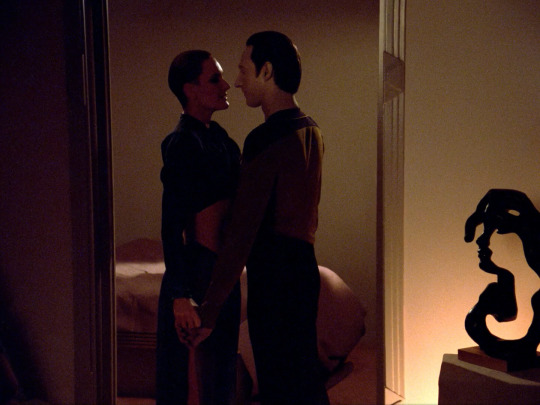
You are fully functional, aren't you?
As we mentioned in our Picard spotlight, “The Naked Now” has the strangest mix of great and terrible character moments, and I couldn’t not include the incredibly hot Data/Yar romance that it created. It’s just nice to know that Data is programmed in multiple techniques, a broad variety of pleasuring. And later, the physical acting we get from Brent Spiner in that lean and fall was great!

My thoughts are not for Tasha, but for myself
While the rest of “Skin of Evil” and the anticlimactic death of Tasha Yar aren’t really our cups of tea, we do have to admit that the tribute scene at the end is moving and well done. And that final moment when Data and Picard talk (even so briefly!) about the point of the ceremony and how empty it will feel without Yar… I’m tearing up just thinking about it.

Tied game, we’re going into overtime
I also have to give Data credit for all the times he uses his big android brain to solve a problem, an advantage he has over pretty much any other character. For example, when he busts Sirna Kolrami up in a game of strategema by forcing a constant stalemate in “Peak Performance,” it feels like a win because he thinks outside the fluorescent holographic box!
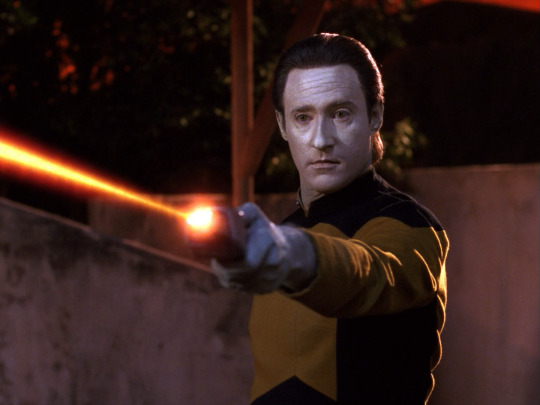
One android with a single weapon
Every so often, we also see Data in command, questioning his leadership skills or having difficulty connecting with his peers (more on that one in a second). But when he’s the only one who can survive the radiation on Tau Cygna, he takes charge to get its colonists to leave by blowing up their aqueduct in “The Ensigns of Command.” Try withstanding Sheliak attacks now, losers!
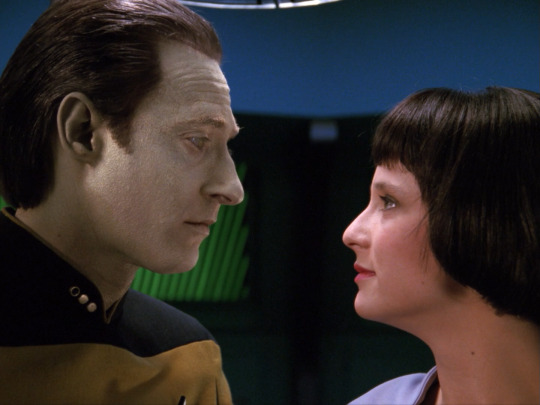
Thank you for my life
While some of us on SSHB didn’t care much for Lal, you’ve got to admit that all of Data’s actions in “The Offspring” are on point. From questioning why he shouldn’t be allowed to create life, to letting his offspring self-identify, to keeping her out of the hands of Starfleet, it’s all good parenting. But what takes the cake is the heart-wrenching farewell scene after he tries to save her.
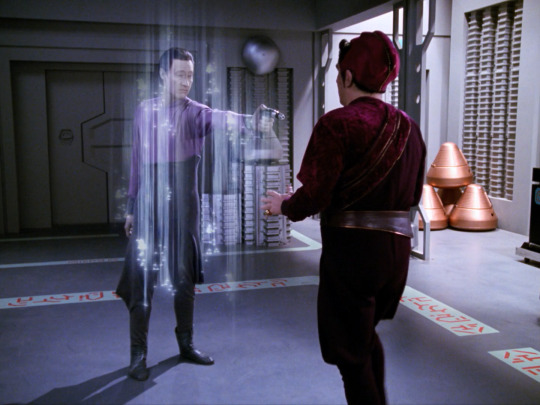
He who dies with the most toys… is kind of an asshole
While we don’t get the cathartic release of Data phasering the hell out of Kivas Fajo in “The Most Toys,” we do get to take some pride that he is capable of overcoming his ethical subprogram to do away with someone who really has no right existing. When Geordi says that he detects a phaser firing in the transporter beam, you know he just needed a fraction of a second more and Fajo would be toast.
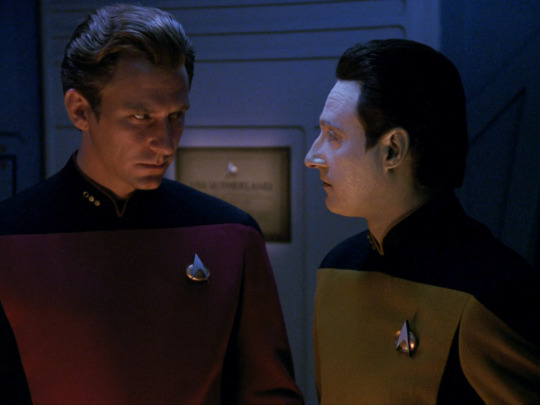
Your request for reassignment has been noted and denied
Like in the afore-mentioned “The Ensigns of Command,” Data has some trouble adjusting to command when he takes control of the Sutherland in “Redemption, Part II.” It sure doesn’t help that his racist XO Hobson undermines his every decision, but that doesn’t stop Data from single-handedly foiling the Romulans’ plan and telling Hobson exactly where to shove it.
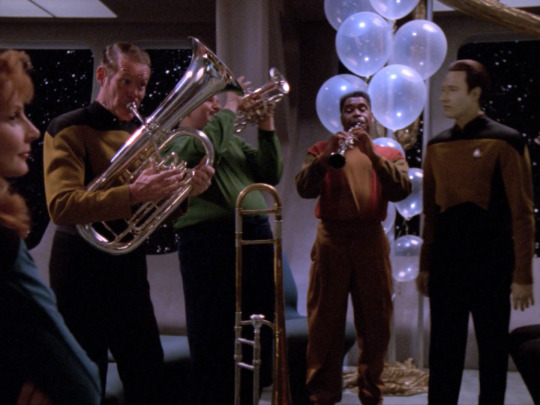
I've never been to a better funeral
When it’s apparent that Geordi has been killed in a transporter accident in “The Next Phase,” Data grapples with the loss of his best friend in a very touching way, similar to how he mourned Yar as we mentioned above. And before he solves the puzzle of the episode and saves them, Data throws the best funeral I’ve ever seen for La Forge and Ro! People are just dying for a funeral like that!

The most human decision you’ve ever made
We gave Picard a lot of accolades when we discussed his standing up for Data’s right to live in “The Measure of a Man.” Data gets a similar moment in “The Quality of Life” when he refuses to trade the lives of the Exocomps for those of other beings. It’s a nice episode of paying it forward, and we also get to see the scientific method on high display when he and Crusher deduce the little guys are alive.
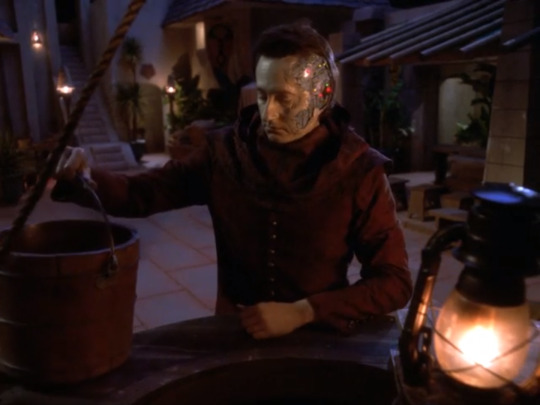
Radioactive. What does that mean?
Speaking of the scientific method! Even with his memories wiped in “Thine Own Self,” Data is able to piece together why the radioactive materials are hurting everyone in the village on Barkon IV. And with that clear slate of mind, we see that in all forms, Data is curious, caring, and willing to help people who are in need, even if it gets him speared in the back a little bit.
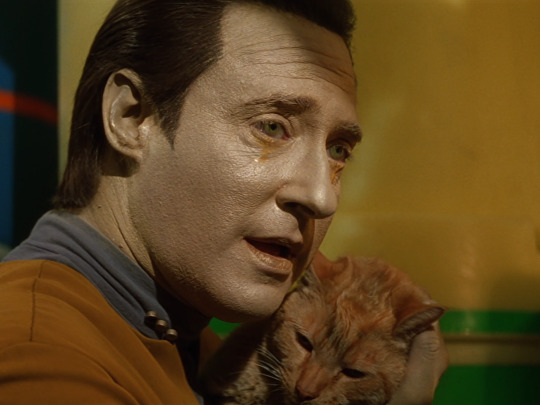
Felis catus is your taxonomic nomenclature…
We’d be remiss if we didn’t bring up Data’s beautiful relationship with his cat, Spot. As everyone on SSHB is a devoted cat person, we found it a treat whenever we saw Data interacting with Spot, testing which food she’d like, and writing cat poetry. The best might be when Data reunites with her after the Enterprise crashes in Generations AND he has the emotions to appreciate it!
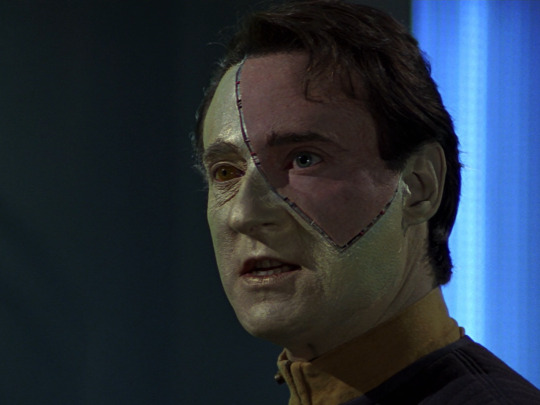
Resistance is fully functional
We noticed in our TOS spotlights that it’s in the movies that most characters get to shine, and First Contact is that chance for Data. His scenes getting tempted by the Borg Queen are dead sexy and you can’t tell me otherwise. And his betrayal of the Collective by purposely sparing the Phoenix and then fumigating engineering to kill Borg Queen are the climax we all needed. I’ll be in my bunk.
—
Worst moments
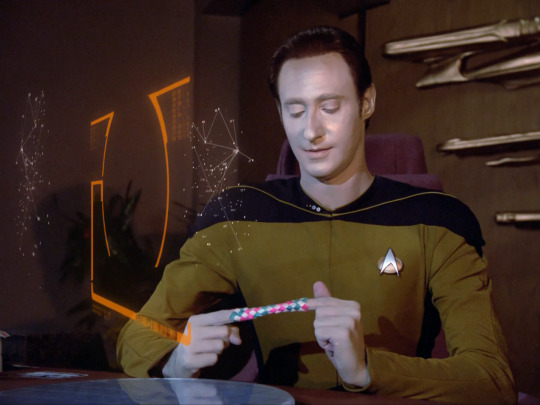
I am stuck
Especially in the early seasons, Data got used to make bad fish-out-of-water jokes. It was a silly habit the show had of depicting him as naïve about human culture even though he’s lived in it for years (and has the memories of the Omicron Thetans when the show remembers). Seeing him get stuck in a fingertrap in “The Last Outpost” is just such an example of dumb sight gags to make him look goofy.

I can’t use contractions, sir
This is just a pet peeve of mine that could have been fixed so damned easily. Listen, writers, if you’re going to make it a plot point that Data can’t use contractions in episodes like “Datalore” and “Future Imperfect,” then be consistent. Run an apostrophe search in Microsoft Word and replace them, because in episodes like “We’ll Always Have Paris” when he states “It’s me,” it pisses me off.
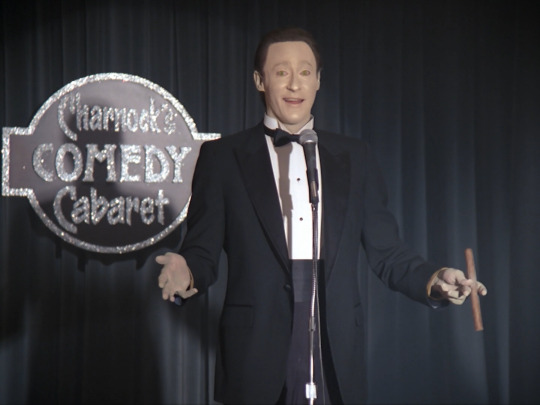
Take my Worf, please!
Don’t worry, we’re not done pointing out all the bad jokes told at Data’s expense that we see throughout the series (oh god, and just wait for the movies). And it’s a shame because Brent Spiner himself has such great comic timing and delivery, but when you make his jokes so obviously idiotic like in Ames’s least favorite TNG episode “The Outrageous Okona,” we cringe so hard.

Is anybody out there?
We mentioned this one in our prime directive chat before, since Data just tramples all over it, but “Pen Pals” has some good discussion on the pros and cons of the situation. But that doesn’t excuse Data for making the decision on his own to get involved with the Dramen people, much less to bring Sarjenka onto the bridge (for crying out loud), necessitating a Pulaski mind wipe!

One seven three four six seven three two one four…
There are a handful of times in TNG that we find it a terrible idea that Data (or any single being) has as much power as they have, considering how often they get possessed by things or duplicated by other things. So when Data single-handedly takes over the Enterprise in “Brothers,” disrupting the mission to save Willie Potts’s life, because Soong hacked into his brain, we raise eyebrows.
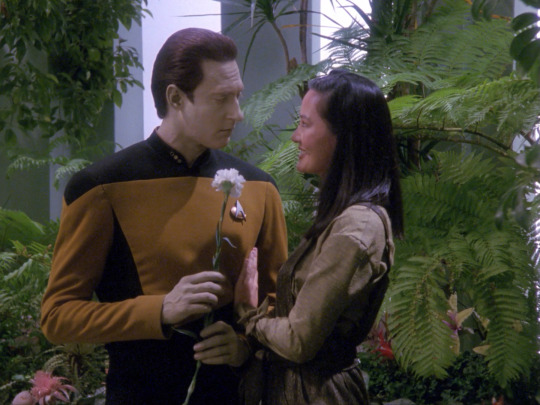
Jilting by association
While I could joke that Data ever introducing Miles and Keiko was a mistake (and I have!), there’re still a lot of bad moves he makes regarding their relationship in “Data’s Day.” When he gets stuck in the middle of their nuptial stress, he’s so clueless how to handle the situation and keeps making things worse when, frankly, Miles and Keiko should have kept things to themselves.
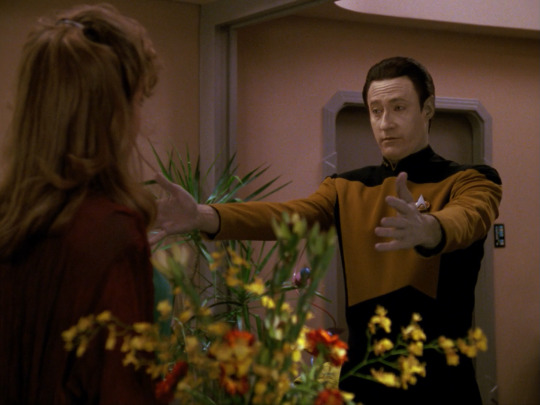
Who programmed the book of love?
Moving on to even more lousy relationships: Data’s brief, unnecessary romance with Jenna Desora in “In Theory” proves to be just another example of too many “Data doesn’t understand humanity” jokes that we hoped the show was over by this point. But alas, he’s written himself a love program to basically treat the situation like a sitcom and we were done with it.
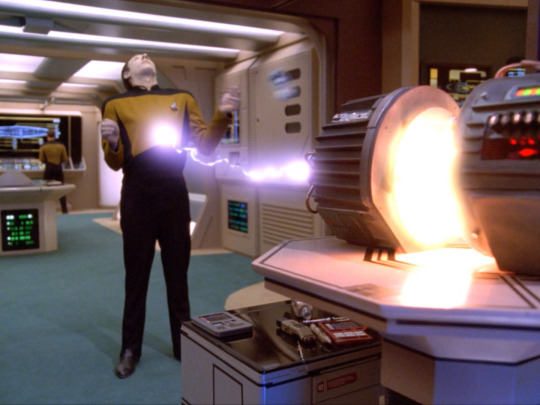
Point that thing somewhere else
From the moment Data stands directly in front of Bashir’s mystery device in “Birthright, Part I,” it’s obvious he’s going to get zapped by it. Really, Data? You couldn’t have stood literally anywhere else than in front of what is clearly an energy beam? And the rest of the episode, we’re stuck going on a dream adventure, and you already know how I feel about those!
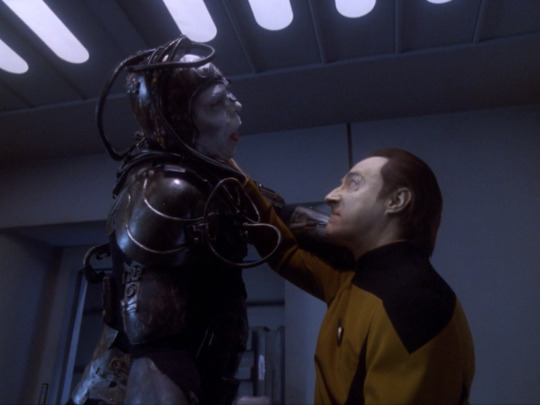
Stop it, stop it, stop it
Like in “Brothers,” it just seems weird to have Data getting controlled by his kooky family members when it happens again in “Descent.” This time, Lore has given Data the emotions he thought he wanted all along, but it turns out the very first emotion Data embraces is sheer rage. When he takes pleasure in killing Borg, you know maybe emotions just aren’t for him, and yet…
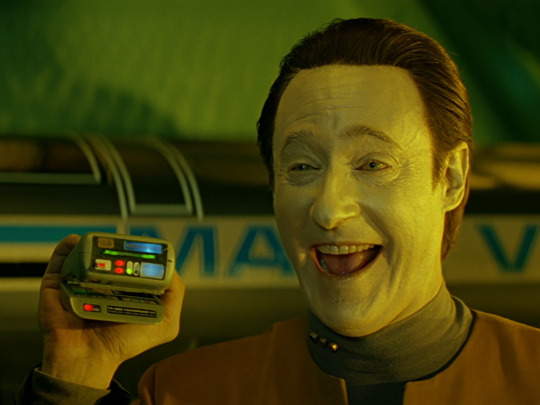
Open sesame!
…when we get to Generations, Data has a fully fledged emotion chip that really needed more testing first. We’re subjected to just way too many of those dopey Data jokes, from Open Sesame to Mr. Tricorder to cackling at a 7-year-old joke. And to add kidnapping and torture to insult, it’s when Data is having a particularly bad reaction that Geordi nearly gets killed by Klingons!

I have been designed to serve as a floatation device
We’re not done yet with the Data humor (and just way too much humor in general that doesn’t land) in Insurrection. While this film really gives Jean-Luc his time to shine, the rest of the cast are treated like afterthoughts, including Data who seems to be around for punchlines, like remarking about how the women’s boobs feel firmer, and serving as a life preserver.

Going out in a blaze of failure
Finally, I need to criticize Nemesis yet again, as I am wont to do. It’s just… Data’s sacrifice for Picard is so unearned. I’d debate that it’s worse than the Kirk sacrifice in Generations that we put in that Worst Moments list too. Most of it is probably the abysmal script. I’ll sum it up by saying this: if you can’t make me care that my favorite character died, you’ve done something wrong.
—
Now that we’ve found Data’s off switch, we can wrap things up this week. Don’t worry, we’ve got tons more character spotlights for the coming weeks, so keep your sensors here, journey over to SoundCloud or wherever you get your podcasts to follow along with our Enterprise watchthough, break the Prime Directive with us on Facebook and Twitter, and delete that comedian holoprogram from the computer!
#star trek#star trek podcast#podcast#data#the next generation#generations#first contact#insurrection#nemesis#the naked now#skin of evil#peak performance#the ensigns of command#the offspring#the most toys#redemption#the next phase#the quality of life#thine own self#the last outpost#we'll always have paris#the outrageous okona#pen pals#brothers#data's day#in theory#birthright#descent#brent spiner
3 notes
·
View notes
Note
Been watching tng lately, so I was wondering if I could ask which are your favourite Data focused episodes (I hope that phrasing makes sense)? Or, like, at what point did you realise how important he is to you? I'm not sure if this is a strange question to ask, but, like, hi. Hope you have a nice day. (@canarycurse)
HI!! Not weird at all!! Ty im honored to be a source of Data Related Information ahaha!!
I really am a sucker for all the Data related eps but there are def some strange ones so i'll give you some of my favorites!!
(in no particular order of preference)
S2E09 The Measure of a Man
This episode is kind of a heavy one but it is VERY worth it, its really Star Trek at its finest imo, positing the question of whether or not Data is a sentient being and what rights he is entitled to with the Federation. In this episode, Data and his friends fight to defend his rights as a sentient being and prevent Starfleet from allowing another Starfleet scientist, Maddox, from deconstructing Data for 'scientific advancement'. Its a really intense episode but i really do think it displays the best of Star Trek on the whole, not just in this series!
S3E16 The Offspring
this episode is ALSO a VERY heavy one but also VERY much worth it. it will probably make you cry. maybe. I did, anyways. In this episode Data creates an android child, basing their neural net off of his own, but with some changes here and there. The child is allowed to choose their gender and appearance, which i think is a really neat thing considering this was made in like the 80s i think, so pretty progressive actually! Anyways, over the course of the episode, this child, Lal is her name, grows and learns as she explores the world around her. I won't spoil too much but it is a very emotional episode!
S5EP11 Hero Worship
finally! A relatively lighthearted episode! In this episode we find a young human boy whose parents had recently been killed along with the rest of their starship's crewmates. The boy is, understandably, traumatized and upon being rescued by Data, latches onto him. This manifests itself in the boy proclaiming himself "an android" in an attempt to emulate Data but more importantly, cope with the loss of his parents. The episode follows the adventures of Data and this boy as they navigate his recovery together. Its a very sweet episode and i just love it!!
S4E11 Data's Day
This episode is kind of a filler episode i think but enjoyable nonetheless! In this episode, Data helps his friends Keiko and Miles prepare for their wedding! I don't remember the 'important' (by important i mean, like the stuff that everyone else is doing on the starship and stuff lol) plotline but the whole thing revolves around Data doing his best to get ready for his friends' wedding!! Its very sweet!!
S4EP3 Brothers
in this episode Data commandeers the Enterprise in response to a homing device being activated, calling him back to his father/creator, Dr. Noonien Soong. I won't get into this one too much because I think it would spoil it too much but just trust me, this one's good!!
I'll stop here bc while there are other good Data-centric episodes out there that I really enjoy, some of them are objectively Really Fucking Weird (aff) and also if i were to list all the ones i like id just be here forever lol
anyways, hope you find one you enjoy!! Thank you so so much for asking!!! :DD
Stay safe and happy!!
2 notes
·
View notes
Text
As per tradition, here is my thoughts on TNG season three (I just realized I finished a whole season in like 10 days wtf)
Well, as you may have guessed that shit was like crack cocaine to me. For comparison, it took me almost 2 months to finish season 2. But season 3... oh man that shit just hit different 😳Finally, finally they have started hitting their stride. I feel like a big problem in season 2 was they had a lot of episodes that had completely unrelated A and B plots. I didn’t really like this because it would sometimes feel awkward jumping around plots in the same episode. I felt like the episodes in this season were a lot more cohesive. Everything just flowed together really nicely and kept me really engaged. Also they are a lot better at keeping characters consistent and likable... I don’t hate Picard anymore, friendship regain with Picard. They stopped writing him as an asshole and made his motivations more clear. Also, I am now in love with Riker, just am. Okay, here are some more specific thoughts on episodes:
Ones that were meh:
Manage a Troi: Idk why but Lwaxana Troi episodes just haven’t hit since her first appearance. Like I say her episode in season 1 was one of the best, but then her season 2 episode was soooo bad. This one was a little better but it was just a little boring and awkward. AND PLEASE! what is the nature of Riker and Troi’s relationship ??? are the exs? are they casually dating?? do they just bone every now and then? I’m so confused cuz like I thought they just had a crush on each other but didn’t wanna pursue a relationship, but then in this episode its just understood they are going to go to Betazoid and fuck. WHAT IS GOING ON!!!
Sins of the Father: I didn’t really like Worf’s brother or the fact they introduced a secret brother. Star Trek, that trope is so tired now. Stop with the secret sibling bullshit. Also I get it’s different for Klingons but I didn’t like that Worf was okay answering for things his biological dad did when he has two adopted parents who love him very much. Also, I have no idea what happened at the end of this episode. Was anyone else confused or was it just because I may or may not have been under the influence of legal substances? I was confused the whole episode.
My favs!!:
The Ensigns of Command: I loooovvveeee episodes were they test Data and he struggles a bit but of course ends up saving the day!!! Very good with tension all throughout and like even the plot on the enterprise was interesting. Also... Data got a little kissy :3
The Enemy: Centurion Bochra!!! CENTURION BOCHRA!!!! Who the fuck doesn’t love a redemption arc for an unhinged boy? I’d say its the backbone of this fucking website. ALSO!! a fucking GEORDI CENTRIC episode ???? we get to see my best friend Geordi save the day and work hard and use his kindness and good attitude and determination and smarts to do it?? I LOVE GEORDI!!!! also i just love Romulans, I think they are my fav evil race (Ferengi very close second)
Offspring: Let me tell you guys, I NEVER EVER cry and media ever, I don’t even cry at ANYTHING!! but.... certain scenes here... may have got me a little choked up... ngl. This episode was so funny but also so heart wrenching, that’s all I’ll say.
Hollow Pursuits: I don’t know, I just really like that they gave us a character centric episode that wasn’t one of the main cast. It was just a super interesting story. The whole time you are kinda tore between routing for Barclay and feeling like he’s a massive creep. Also, it shows the main cast an imperfect and not always accepting, as even the captain is a little mean to Barclay at one point and Riker kinda turns into a Chad bully. Idk it was an episode I would never expect from this show but very much enjoyed.
The Most Toys: yes Three out of five of my favorite episodes were Data centric ones, fucking sue me. I’m a basic Data loving bitch I will fully admit to that. I have a lot to say about this episode and what I wish they would have done different, but i think I’m going to post about that separately. But anyway, when Data went against his own will and sat in the chair to save that women's life... that shit got to me. I think about that scene daily
Okay, that’s all for now folks!! feel free to debate me in the comments and what not
#star trek#I read my season 1 reflection again#man it's so crazy#how man opinions are sooo different now#tng#the next generation#this was a ramble afffffffff
19 notes
·
View notes
Note
Not to be too forward but please drop your TNG watch order.
okay tng is. complex. here’s how i’d do it I think. I’m jumping about a lot, and I’m also struggling to remember a lot of it because my first watch was 7 years ago and my rewatch w friends we just did Sherlock Holmes and then went straight into chronological order. so this is like, combo of a handful of eps I remember being plot important and just stuff that makes me laugh.
Elementary, My Dear Data (S2E3) and Ship In A Bottle (S6E12). a) introduces you perfectly to the concept of holodeck episodes, which will be important later b) DaForge married gay energy off the charts c) Picard is really fun. the only failing of this as a start is the tragic lack of Guinan
ALL of the Q eps. Speedrun the Qcard nonsense and get a lot of the overall show plot
Encounter at Farpoint (S1E1 and S1E2)
Hide and Q (S1E10) - unnervingly babyfaced Riker. you could skip this one but it lays some good basis for who the Q continuum are, but it’s kind of fun
Q Who (S2E16) - borg introduction! absolute must watch. The insanity of ‘to learn about you is frankly provocative… but you’re next of kin to chaos’ as a line alone, let alone the voice Patrick Stewart gives to it. Iconic episode.
Deja Q (S3E13) - Q getting turned into a human as punishment for being a naughty boy. V funny, must watch
QPid (S4E20 babeyyyyy) - MUST WATCH one of thee funniest episodes and experiencing the QCard speedrun from farpoint to qpid is a very special kind of brainworms
True Q (S6E6) - this one is skippable tbh, but it is pretty fond and I’m personally fond of running a full Q supercut
Tapestry (S6E15) - this one isn’t as fun as most Q eps but it is VERY TNG-ish and therefore a must watch. If you’ll forgive the pun, it really gets at the heart of Picard’s character
All Good Things (S7E25 and S7E26) - as with most Star Trek finales it’s not the best. You don’t have to watch this here but it can be a fun bookend for the Q speedrun
You could also go watch DS9’s Q-Less (S1E6) if you’d like to see Q get punched in the face, it’s really very satisfying
You kind of have to watch The Best of Both Worlds (S3E26 and S4E1). If you’ve seen TNG before, you don’t need to worry about when you watch it. If you haven’t seen any TNG yet, watch it here.
Darmok (S5E2) - THEE most star trek of all star trek’s. hmu if you ever want me to rant about Darmok I have a whole badly-structured personal essay about it ready to go at all times
Disaster (S5E5) - Geordi and Crusher teamup is really fun, and ‘executive officer in charge of radishes’ is the best line in all 7 seasons of TNG
Schisms (S6E5) - you could just watch from the opening until Data’s poetry recital ngl. The ep is decent and I’d personally watch it all but this ep is mostly about Data’s poetry.
Sub Rosa (S7E14) - Crusher fucks a ghost. iconic behaviour
Dixon Hill eps! They’re fun and silly and much like watching TOS’ A Piece of The Action
The Big Goodbye (S1E12)
Manhunt (S2E19) - Lwxana. I’d do anything for Lwxana
Clues (S4E14) - Guinan as Gloria is so much fun I love her and she should have got a full episode!!!!!
The Measure of a Man (S2E9) - important Federation and Data lore. Very emotional.
Yesterday’s Enterprise (S3E16) - Tasha’a back!!!!!!!! Just a very cool ep imo
Hero Worship (S5E11) - Extremely good Data ep, good content about Federation attitude to mental illness
Datalore (S1E12) - another important Data ep, and Lore is laways fun
The Offspring (S3E16) - Data wants to be a dad!!!
I, Borg (S5 E23) - HUGH!!! IT’S ALL ABOUT HUGH!!!!!!!!! (I like to watch this right after The Offspring because it’s direct parallels of geordi and data just wanting to take care of people)
Brothers (S4E18) - more Data (And Lore) content
Descent (S6E26 and S7E1) - not required watching, but Lore is fun and evil
Fistful of Datas (S6E7) - EXTREMELY SILLY GOOD FUN ALLROUND. CAN NEVER GO WRONG W ACOWBOY EP
Sarek (S3E23) - I can’t remember the plot I just know Sarek shows up in a lavender robe and has mad chemistry with Picard. I’m pretty sure they mind meld really hard??? Lord help me the old men you put on this spaceship to do politics are exploring eachothers’ minds in the most intimate manner possible <3
Unification (S5E7 and S5E8) - Spock attempts to re-unify Romulus and Vulcan. Iconic 2-parter, but definitely the kind of episode that benefits from watching with a friend so you can add commentary
if you like Romulan episodes you could watch the full Sela arc before this one (The Mind’s Eye S4E24, Redemption S4E26/S5E1, Unification)
Face of The Enemy (S6E14) - I can’t remember the entire plot but I’m pretty sure it was good and I love a good Romulan ep
The Host (S4E23) - Trill introduction!!!! So good.
The Game (S5E6) - profoundly stupid but worth it for how funny the graphics for the game are
Cause and Effect (S5E18) - just a pretty cool one
Time’s Arrow (S5E26 and S6E1) - One of TNG’s strongest plots imo
The Inner Light (S5E25) - another banger plot; Picard gets hit by a psychic probe and lives an entire life in a history that has already happened. there’s a really good Spones fic based on this episode and I could read an au like this for any ship I swear
Relics (S6E4) - Scotty!!!! It’s fun
Chain of Command (S6E10 and S6E11) - another one of TNG’s strongest plots. The origin of the ‘there are FOUR lights’ meme.
Birthright (S6E16 and S6E17) - this is an infamous double parter but all I actually remember is Julian Bashir appearing and meeting Data
Ensign Ro’s intro ep Ensign Ro (S5E03) i LOVE her
The Next Phase (S5E24) - cool ep where Ro and Geordi get stuck out of phase and are invisible from the crew, pretty fun
and the end of her arc with Preemptive Strike (S7E24)
I personally love Barclay and just choose to live in a universe where the misogyny wasn’t happening and he was just a weird little man, but if he bothers you, you can skip his arc. Don’t skip Genesis tho it’s good
Hollow Pursuits (S3E21)
The Nth Degree (S4E19)
Realm of Fear (S6E2)
Genesis (S7E19) - perfectly batshit star trek fake science. I love it
Masks (S7E17) - extremely silly and therefore fantastic
after this point I’d go back and watch in order all the way through, or look up a watch order for eps that are actually important plot-wise :’)
29 notes
·
View notes
Text
My essential Star Trek episodes
@velociraptors-in-hats asked me for a list of essential Trek, and this is gonna be way too big for a text message, so here we go.
The Original Series (TOS)
While a lot of the show holds up surprisingly well for being over 50 years old, the pacing and aesthetic is incredibly dated. There’s a lot you can skip here.
Highlighted episodes:
“Charlie X”: If anyone tells you Kirk is a womanizer, point them at him teaching found teenager Charlie to behave himself.
“The Corbomite Maneuver”: If you wanna see Kirk do what Kirk is best at, this is a good place to start.
“Balance of Terror”: an antiracist cold war submarine drama in space (borrows heavily from movies like Run Silent, Run Deep)
“The Menagerie”: This was an excuse to recycle the unaired pilot, but the unaired pilot is a pretty good story and it’s framed by courtroom drama and Spock going rogue for a good cause.
“The Galileo Seven”: another really good drama centered on Spock.
“Space Seed”: I know I already said that this isn’t necessary to understand Wrath of Khan, but it’s a great episode anyway. If you have an opportunity to watch Ricardo Montalban act, it is best not to miss it.
“City on the Edge of Forever”: arguably the greatest Star Trek episode of the entire franchise.
“Amok Time”: You wanna see Kirk and Spock wrestle in the sand. You know you do.
“The Doomsday Machine”: more great writing.
“I, Mudd”: illogic bombs everywhere.
“Journey to Babel”: Father and Son drama, the beginning of “Spock doesn’t talk about his family until they’re standing in front of you”
“The Trouble with Tribbles”: the biggest space romp ever.
“Patterns of Force”: one of many Space Nazi episodes (there’s even more than one with literal Nazis), but the best one.
“Spock’s Brain”: there’s probably a drinking game for this one. Do not follow any rules about drinking for the word “brain” or you will die.
“The Enterprise Incident”: It’s hard to remember this is third season TOS because they were actually still trying here.
“All our Yesterdays” is pretty cool sci-fi. Time travel, marooned, going native-ish.
The Next Generation (TNG)
The first two seasons are the most skippable Star Trek has ever been, but if you wanna get a sense of it, I recommend considering any of “Lonely Among Us”, “The Battle” (gets a sequel seven years later), “The Big Goodbye”, “Datalore”, “Too Short a Season”, The Arsenal of Freedom”, and “We’ll Always Have Paris” from the first season, and “Where Silence Has Lease”, “Elementary Dear Data”, “The Measure of a Man” (civil rights courtroom drama, referenced heavily in the recent Picard series), “Q Who” (first Q episode I actually recommend, introduces the Borg), and “The Emissary” (starts an arc with Worf that will last into Deep Space Nine).
I do not recommend “Shades of Gray” unless you are really interested in what you missed from skipping the first two seasons. It doesn’t even have the So Bad It’s Good that The Enterprise Incident does.
I’m gonna have to get really discriminating here or this is gonna get really long now. I grew up with TNG and more than half of the episodes are ones I have some reason to love. (narrator voice: he did not get more discriminating)
Probably any Q and Borg episode from here.
“Yesterday’s Enterprise” is an alternate universe drama where we shift into a darker timeline where the Federation is losing a war with the Klingons (who are our friends now normally).
“The Offspring” - Data makes a child and it goes better than could be expected until it doesn’t.
“Sins of the Father” - this is where Worf’s arc really gets going.
“Allegiance” is just a good episode.
“Captain’s Holiday” is a bit pulpy. It was written because Stewart was complaining that the captain doesn’t do enough shooting and screwing. But it’s fun. Vash is fun.
“Sarek” has a great scene for Patrick Stewart showing Picard have another man’s breakdown for him.
“The Best of Both Worlds”: for the best effect, watch part one, then wait three months before watching part two.
“Family”: partly an epilogue to Best of Both Worlds, but a great story for Picard. And I think it’s another one in Worf’s main saga.
“Brothers”: this is the quintessential Data episode. If you only watch one episode with Lore, watch this one.
“Reunion” seeds the Klingon Civil War arc.
“Final Mission”: you are probably not going to see Wesley at his worst, but this episode is Wesley at his best. It is his final episode as a regular.
“Data’s Day”: literally a day in the life story, but Data is a lot of fun.
I personally really like The Nth Degree.
“The Mind’s Eye” is an “It’s very good but I would rather not rewatch it please” episode, but as with Chain of Command, torture stories are not a good time for me.
“Redemption” 1 and 2 brings home the Klingon Civil War and also ties in Yesterday’s Enterprise.
“Darmok”: Good science fiction predicts the internet. Great science fiction predicts communication through memes.
“Unification” 1 and 2: remember how the Vulcans and the Romulans look alike? This is important.
“Ethics” is well-written moral drama, but one of the two debates it engages with is assisted suicide, so you specifically will probably want to pass.
“The Inner Light” is a bit of a one-off, but you get to experience a man’s entire life as Picard experiences it.
A lot of people will tell you that “Time’s Arrow” is the weakest season cliffhanger, but I just think that running around San Francisco in the time of cholera with Mark Twain and Jack London is a lot of fun.
“A Fistfull of Datas”: Would you like to watch a spaghetti western where every character is played by Brent Spiner? Of course you would!
“Ship in a Bottle”: a sequel to “Elementary Dear Data”
“Tapestry”: possibly not actually a Q episode. Picard gets to face an old regret and see how his life would be different if things had gone another way.
“Frame of Mind” is a psychodrama where Riker’s reality falls apart.
I like high concept stories about time. “Timescape” is Clockstoppers before Clockstoppers.
Watch “Attached” if you find yourself shipping Jean-Luc and Beverly.
“The Pegasus” sees Riker forced to face the ghost of a past shame he thought was buried.
“Sub Rosa” is another one that everyone hates that I like. I’m just a sucker for the Scottish Highlands In Space setting, but to be fair to its detractors it was literally plagiarized from an Ann Rice paranormal romance novel.
“Lower Decks”: the characters we usually spend time with are up in the stratosphere in terms of the hierarchy on the ship. This episode takes the perspective of some junior officers.
“Masks” because Brent Spiner needs to set records for “most characters played in a single episode”.
“Emergence” is a creepy weird high-concept episode I really like.
“All Good Things” is unmissable. When you feel like you’re at home with TNG, watch the finale.
Deep Space Nine (DS9)
Again, the first few seasons are a bit awkward before the show finds itself. However, “Emissary” is possibly the best series premiere the show has ever done. This is a highly serialized show (for its time), so the deeper into the show, the more you should really watch them in order.
“Move Along Home” is another in the “so bad it’s good” pile. Get to know the show before you watch it.
Most people will tell you that “Duet” is one of Deep Space Nine’s best episodes. What would you do if you just arrested Josef Goebbels?
“In the Hands of the Prophets”: the Scopes Monkey Trial in space kind of.
“Whispers”: creeeepy. O’Brien is firmly cemented as the show’s designated sufferer.
“Shadow Play” is one of the early episodes that probably would’ve worked better for TNG, but I kind of like it.
“Blood Oath”:probably the beginning of Jadzia Dax being everyone’s favorite lesbian (/bi/trans) icon.
“The Maquis” two-part story is kind of a mission statement for the show.
“The Wire”: one of the two most Garak/Bashir episodes of the entire run.
“The Search” is a big reveal that has consequences for the entire rest of the series.
“The House of Quark” is a really fun episode pairing Ferengi and Klingon culture like oil and vinegar making salad dressing.
“Equilibrium” is a great episode for getting into the whole deal with Dax’s Trill gimmick.
“Civil Defense:” they trigger a lockdown protocol the Cardassians meant to use to suppress a Bajoran riot.
“Past Tense”, two parts. Please oh please don’t let the real 2024 look like this. One of DS9′s most prescient episodes (inspired by the Rodney King riots).
“Destiny” is one of the best episodes in the “Sisko has to reckon with being the Bajorans’ messiah figure” arc.
“Improbable Cause”/”The Die Is Cast” (DS9 is a bit averse to putting the same title on every part of a multipart story): dark, plot-heavy, and pretty important to what’s coming up soon.
“Family Business”: I think this is the introduction of Quark’s mother, the Ferengi feminist.
“The Adversary” is big for Odo.
“The Way of the Warrior” is basically the show’s second pilot episode.
“The Visitor” is a one-off story about the bond between Ben and Jake Sisko.
“Rejoined”: Give Jadzia A Girlfriend
“Little Green Men”: a one-off romp at the 1947 Roswell crash.
“Our Man Bashir”: Bashir and Garak are gay at each other while larping Bashir’s James Bond fantasy, only it turns deadly because the camera wandered into the holodeck again.
“Homefront”/”Paradise Lost”: again, a very Relevant episode where a terror attack on Earth causes the enactment of martial law.
“Bar Association”: Quark’s brother reads Das Kapital and starts a union. No seriously, that’s the episode.
“Body Parts”: Quark gets misdiagnosed with a terminal illness, sells his remains as is the Ferengi custom, and hijinks ensue (possibly triggering because he considers putting a hit on himself to get out of his dilemma).
“Broken Link”: this is a very big Odo story.
“Apocalypse Rising”: carries on from the not-really-a-cliffhanger in “Broken Link”, but it’s more about going undercover in the Klingon empire.
“Trials and Tribble-Ations”: Let’s go full Back to the Future Part 2 on a fan favorite TOS episode.
“For the Uniform”: explores the lengths Sisko will go to against a traitor.
“Doctor Bashir, I Presume”: Julian Bashir gets outed. The basis of the “Julian is transmasc” theory/metaphor.
“Children of Time”: high concept morality play. The crew meet their descendants from the crash they haven’t experienced yet.
“In the Cards”: notably, the A story is a breather romp and the B story is Plot Arc stuff.
Take “Call to Arms”, “A Time To Stand”, “Rocks and Shoals”, “Sons and Daughters”, “Behind the Lines”, “Favor the Bold”, and “Sacrifice of Angels” as a six-part arc. It’s not exactly one long story, but they were written as a short arc and play through each other.
“You are Cordially Invited”: Klingon Bachelor Parties are almost as bad as Klingon mothers in law.
“Statistical Probabilities”: following on from what we learned in “Doctor Bashir, I Presume”, Bashir tries to help some institutionalized augments find a greater purpose than being locked up in an asylum.
“Far Beyond The Stars”: a one-off where Sisko has a vision of being a pulp sci-fi writer in the 50s trying to get a story about a black man commanding a space station published.
“One Little Ship”: just some fun with a negative space wedgie that shrinks people.
“Wrongs Darker than Death or Night”: Kira learns what her mother did to keep her family safe.
“Inquisition”: Bashir gets accused of having been brainwashed into an unwitting spy.
“In the Pale Moonlight”: how many lines will Sisko cross in order to win the war?
“His Way”: Odo gets mentored in dating by a 50s lounge singer hologram.
“Valiant”: a crew of cadets that think they can do anything go cultish when their senior officer dies and they have to run the ship by themselves behind enemy lines.
“Take Me Out To the Holosuite”: the war is pretty grim, let’s play baseball against Sisko’s academy days bully.
“Treachery, Faith, and the Great River”: Odo escorts a defector who sees him, like all of Odo’s kind, as a god (because that’s how Odo’s people control them).
“The Siege of AR-558″: the War is Hell episode of the War Is Hell series.
“It’s Only a Paper Moon”: Quark’s nephew escapes reality in the 50s lounge singer’s world after losing a leg in the war.
“Prodigal Daughter”: It’s season seven, so Ezri Dax gets a lot of focus because they only had one season to get to know her. But this is one of the best Ezri episodes.
“Badda Bing, Badda Bang”: Deep Space Nine does Ocean’s Eleven.
The ten episodes after that are the Final Chapter arc, which ties up all the stories they had in the air for the last seven years.
Voyager (VOY)
“Caretaker” sets up a lot of things, some of which will even actually be followed through on.
“Faces”: an alien scientist splits the half-Klingon/half-human engineer into her human and Klingon halves.
“The 37s”: I don’t remember much of this one aside from they find Amelia Earhart and others from that time cryogenically frozen on a planet on the other side of the galaxy, and we get to see the ship land for no particular reason.
“Projections”: Doctor episodes are great in general. This one has the Doctor’s reality breaking down.
“Twisted”: weird space stuff warps space inside the ship.
I really like the Q episodes on Voyager, but if discussion of suicide is triggering, you should know that “Death Wish” is about a Q (not The Q, another one. They’re all named Q and so is their species) who wants the right to end his immortality.
“Deadlock”: Voyager is duplicated by a negative space wedgie, but only one can survive because reasons.
“The Thaw”: a great episode about facing Fear. Guest starring Michael McKean as a personification of Fear.
“Resolutions”: Hey, did we set up romantic tension between the captain and her first officer? Let’s put that to bed.
“Flashback”: Janeway and Tuvok go inside Tuvok’s memories of the five minutes Sulu was in The Undiscovered Country.
“Sacred Ground”: this episode kind of defines how I see the relationship between faith and skepticism.
“Future’s End” (two parts): Remember The One With The Whales? We’re doing it again twelve years later, but with Sarah Silverman instead of whales.
“The Q and the Grey”: Q (yes actually that one) gets Janeway involved in a Q Civil War because somehow making a Q baby is going to end it and he wants Janeway to be his baby mama.
“Coda”: Janeway gets stuck in dying dream after dying dream.
“Before and After”: Kes is jumping backwards in time.
“Worst Case Scenario”: episodes where the cast get to play evil versions of their characters are fun.
“Scorpion” (2 parts): Janeway makes a deal with the devil.
“Year of Hell” (2 parts): they wanted to do an entire season of this, which in turn was inspired by what they’d originally planned for the show all along before the suits decided it should be a safe TNG knockoff.
“Message in a Bottle”: They find a way to send transmissions across the galaxy, but for Reasons, text and video messages can’t get through, but a hologram can, so the Doctor has an away mission to the Alpha Quadrant.
“Living Witness”: a one-off episode with a backup copy of the Doctor in the far future setting the record straight on Voyager’s involvement in a war between two planets.
“Timeless”: Chakotay and Harry made it home, but the rest of the crew died in a crash. So now they’re on the run from the law to send a message back in time to put it right.
“Latent Image”: the Doctor’s memories have been tampered with.
“Bride of Chaotica!”: a holodeck Buck Rogers fantasy goes off the rails.
“Course: Oblivion”: the ship and crew start to fall apart.
“Someone to Watch Over Me”: Voyager does My Fair Lady.
“11:59″: As an Indiana native I am legally obligated to recommend this story about what Janeway’s ancestor was doing on New Year’s Eve 1999.
“Relativity”: Time chase. Somebody’s trying to blow up Voyager in the past.
Equinox (Two parts): What if Voyager hadn’t held onto its ideals in their quest to get home?
“The Voyager Conspiracy”: good sci-fi anticipates the internet. Great sci-fi anticipates people finding patterns that don’t exist in the information overload.
“Pathfinder”: Remember Barclay? His latest awkwardness is his obsession with Voyager.
“Fair Haven”/”Spirit Folk”: these aren’t directly paired, but they’re both set in holographic Ireland. In the first one, Janeway tailors her holographic boyfriend to exactly what she wants, in the second, the characters have been running for so long they start to get the sense that there’s something strange about the out of towners.
“Life Line”: The Doctor gets transmitted across the galaxy to save his creator from an illness.
“The Haunting of Deck Twelve”: Neelix tells the Borg Children a ghost story that maybe really happened.
Unimatrix Zero (two parts): I don’t remember much of this, but it’s one of the biggest Borg stories in a show that overused the Borg.
“Imperfection”: Seven of Nine is practicing being human on the holodeck and starts to have a systems failure.
“Critical Care”: the Doctor gets captured by an alien hospital and fights against the stratification of their healthcare system.
“Inside Man”: Barclay again. He sent a hologram of himself to help Voyager get home.
“Flesh and Blood”: a hologram rights story.
“Shattered”: the ship is fractured in time, and Chakotay is roaming the ship through different time periods trying to reintegrate it.
“Lineage”: B’elanna goes a little overboard tinkering with her baby’s genome.
“Q2″: It’s a Q episode, and nobody’s suicidal.
“Renaissance Man”: The Doctor does more than he was ever designed for.
“Endgame”: the end.
Enterprise (ENT)
I’ve only watched most of these once. I really don’t know the show that well.
I can tell you that the first two seasons are a bunch of one-offs with the major theme being “we’re out here to make friends and introduce ourselves to the neighborhood”. The third season is Star Trek’s answer to 9/11 and it goes really Jack Bauer. There are some one-offs, but it’s very focused on the Xindi threat. The fourth season is short arcs where they got around to being a prequel show and did a lot of the good kind of callbacks to TOS.
Discovery (DIS, Disco, DSC, definitely not ST:D)
Modern-era Star Trek is very serialized. It would take less time to say which episodes of Discovery are skippable. I’ve only seen the first season once, and I’m still not done with the second season. Captain Pike from the original TOS pilot is the captain in the second season and he is the best thing about modern Trek.
Picard (PIC?)
There’s only one season so far, and it is 100% serialized. It doesn’t have filler episodes, it has filler spread out through all the episodes. They told a four or five episode story in ten episodes. Though really not much happens between the end of the first episode and when they pick up Seven of Nine. The stuff on the Borg Cube is highly skippable until episode 6.
Lower Decks (LD?)
This is currently in its first season. It’s an adult-oriented animated comedy by the guy who did TNGs8 on Twitter and his most notable professional work before this is Rick and Morty. It’s a loving tweak on the nose of Star Trek.
The future
There’s a Nickelodeon show coming up called “Prodigy” that we don’t know much about. It’s animated, it’s for kids, and it’s about a ship crewed by cadets.
Discovery season 3 is coming very soon, again going in a completely new direction from the first two seasons.
Picard is going to get a second season eventually. It doesn’t seem to have been part of the plan, but there it is.
There’s also Strange New Worlds, a... Discovery spinoff? Centering on Discovery’s version of Pike commanding the Enterprise with Number One and Spock, and it’s planned to be more episodic. Also coming whenever the world isn’t on fire.
7 notes
·
View notes
Text
Tiny Viewing Guide to Star Trek: The Next Generation
Just found out one of my oldest friends, a huge sci fi guy, has never actually seen TNG, or indeed any Trek. He asked if I wouldn't mind writing a viewing guide. Not all that tiny, but the blurb for each episode is tiny. YMMV.
S1
Encounter at Farpoint - Goofy but iconic, series premiere
The Naked Now - Bad but hilarious and a little important
Code of Honor - terrible racist horseshit
The Last Outpost - first time we meet the Ferengi, they're not impressive
Where No One Has Gone Before - interesting enough
Lonely Among Us - I have no memory of this place
Justice - terrible outfits, Wesley episode
The Battle - Picard episode, not terrible
Hide and Q - Riker-centric Q episode, not the best Q episode, not the worst
Haven - first time we meet Lwaxana, don't remember anything else
The Big Goodbye - first of many holodeck episodes, pretty good
Datalore - important!!!
Angel One - totally forgettable
11001001 - meh
Too Short a Season - weird, generally meh
When the Bough Breaks - Wesley episode, don't remember it much
Home Soil - no clue
Coming of Age - more Wesley (can you tell Gene Roddenberry liked the character?), but not bad
Heart of Glory - first time the Klingons get real character, important
The Arsenal of Freedom - automated weaponry is bad, mmkay
Symbiosis - nope, no idea
Skin of Evil - dark, nasty, generally unpleasant episode, important for character reasons
We'll Always Have Paris - genuinely do not remember this one but wiki says there's time travel and that's always fun
Conspiracy - real mixed feelings about this one, it's tense and interesting TV but not really good Trek and it has huge implications that are never revisited
The Neutral Zone - Romulans are reintroduced, pretty cool
S2
The Child - pretty decent Troi episode
Where Silence Has Lease - interesting space puzzle episode sprinkled with Picard philosophizing
Elementary, Dear Data - first Sherlock!Data holodeck episode, excellent stuff
The Outrageous Okona - weeeaaaak, but kind of funny
Loud As A Whisper - cool deaf character, cringey late-80s implementation
The Schizoid Man - Data episode, good acting, cringey dialogue
Unnatural Selection - Pulaski-centric, and I dislike Pulaski so this is a pass for me
A Matter Of Honor - Riker serves on a Klingon warship, some good stuff
The Measure of A Man - Easily a top 10 Trek episode of all time
The Dauphin - Wesley has a crush, receives terrible romantic advice from entire crew
Contagion - interesting lethal archaeology
The Royale - love this episode, it's terrible and bad science but I love it
Time Squared - weird time-travel stuff, not one of the best
The Icarus Factor - lot of good character stuff, terrible future martial arts
Pen Pals - excellent Data episode, thoughts about the Prime Directive
Q Who - WATCH THIS ONE
Samaritan Snare - bad episode, funny moments
Up The Long Ladder - holy shit the Irish racism
Manhunt - Lwaxana Troi at her best, love it
The Emissary - Amazing Klingon stuff
Peak Performance - good episode, lots of fun character bits
Shades of Gray - TERRIBLE CLIP SHOW AVOID AVOID AVOID
S3
Evolution - Wesley episode, not bad but not great
The Ensigns of Command - Mediocre Data episode
The Survivors - space puzzle episode, OK
Who Watches the Watchers - more prime directive stuff, mildly interesting
The Bonding - interesting stuff about grief
Booby Trap - another space puzzle, high stakes, cool payoff
The Enemy - Pretty good, Romulans
The Price - fun episode
The Vengeance Factor - ehhhhhhhh
The Defector - More Romulan stuff, is good
The Hunted - will 100% make you scream at how terrible security is in the future, not a bad ep though
The High Ground - ugh, just not great
Deja Q - good Q episode
A Matter of Perspective - let's use the holodeck to prove Riker couldn't have committed this crime!
The Offspring - WATCH THIS BUT BRING TISSUES
Sins of the Father - first of many Klingon Politics episodes, I love these with a fiery passion and my wife is bored to tears by them so YMMV
Allegiance - space puzzle, not a great one but not bad
Captain's Holiday - WATCH THIS, IS AMAZING
Tin Man - literally put me to sleep once
Hollow Pursuits - First of many Barclay episodes, my beautiful autistic space boi
The Most Toys - alright, worth one watch
Sarek - SO IMPORTANT WAAAAAAAAAATCH
Menage a Troi - bad episode, worth it for the payoff
Transfigurations - Jason Ironheart called, he knows he came after this episode chronologically but he was better
The Best of Both Worlds, Part 1 - YAAAS
S4
The Best of Both Worlds, Part 2- YAAAAAAAAAAAAAS
Family - So important
Brothers - Very Important
Suddenly Human - meh
Remember Me - very interesting space puzzle, one of the Crusher episodes where she gets to be awesome
Legacy - not the most jaw-dropping ep but important
Reunion - KLINGON POLITICS YEEES
Future Imperfect - interesting enough
Final Mission - Wesley episode, not bad
The Loss - v. good Troi episode
Data's Day - fun, wholesome Data times
The Wounded - SO GOOD AND SO IMPORTANT
Devil's Due - I love this episode even if it's not that important or good
Clues - Awesome space puzzle
First Contact - eh? okay? sure?
Galaxy's Child - fine, whatever
Night Terrors - uuuuugh, no
Identity Crisis - this one scared the fuck out of me as a kid and may be responsible for my deep-seated body-transformation-horror triggers, now it's just kind of weird
The nth Degree - BARCLAY, LOVE HIM AND THIS EP
Qpid - YES SO GOOD
The Drumhead - This is Michael Dorn's favorite episode and it is worthy of the title
Half a Life - Lwaxana is great, the episode not as much
The Host - introduction of the Trill, kind of cringey almost 30 years later
The Mind's Eye - brainwashing stuff, meh
In Theory - Data tries to date, hilarities ensue
Redemption Part 1 - GIVE ME THE KLINGON POLITICS
S5
Redemption Part 2 - MOOOOOOOOOORE
Darmok - One of my top 5 episodes in the series
Ensign Ro - so important, introduces the Bajorans and Ensign Ro
Silicon Avatar - important for Data, not a terribly interesting episode otherwise
Disaster - Troi gets to shine! cool episode
The Game - by far the worst Wesley episode. everyone is seduced into acting like a brainwashed idiot by a terrible space future video game. fuck this episode and everyone who wrote it but especially Brannon Braga.
Unification 1 - WATCH
Unification 2- THESE
A Matter of Time - So good, waaatch
New Ground - I am not a fan of Alexander but he is so important to Worf's growth, so... yeah
Hero Worship - more stuff about grief, eh
Violations - I don't remember this one that much but I do not think I enjoyed it
The Masterpiece Society - read the above description
Conundrum - amazing space puzzle episode. easily one of my favorites in the series
Power Play - meh
Ethics - very important, good Trek
The Outcast - THIS EPISODE COULD HAVE BEEN SO MUCH BETTER IF THE LOVE INTEREST WAS MALE. JONATHAN FRAKES PUSHED FOR A MALE ACTOR. watch it anyway
Cause and Effect - fun space puzzle, a little repetitive but totally solid
The First Duty - one of the best Picard Speeches ever, watch
Cost of Living - fun Lwaxana episode
The Perfect Mate - pretty meh but Famke Janssen is fun as Kamala
Imaginary Friend - so bored
I, Borg - INCREDIBLY IMPORTANT
The Next Phase - interesting episode about the afterlife
The Inner Light - THIS IS MY FAVORITE EPISODE OF THE ENTIRE SERIES AND I CRY EVERY TIME
Time's Arrow 1 - Such good time travel
S6
Time's Arrow 2 - Such great Mark Twain
Realm of Fear - Yay more Barclay!
Man of the People - bad Troi episode
Relics - WAAAAAAAAAATCH
Schisms - space puzzle, kind of lame payoff due to effects limitations but the journey is worth it
True Q - By far the worst fucking Q episode ever written
Rascals - uuuuuuuugh. half the crew is regressed into children. Ferengi are involved. you are missing nothing.
A Fistful of Datas - amazing dumb holodeck episode, watch
The Quality of Life - boring episode, good message
Chain of Command 1 - So dark, so difficult, so totally riveting and important
Chain of Command 2 - See above
Ship in a Bottle - Sequel to Sherlock!Data, amazing
Aquiel - could have been written much better
Face of the Enemy - by far the best Troi episode, Marina Sirtis was incredibly happy when I told her it was one of my favorites
Tapestry - fantastic Q/Picard episode
Birthright 1 - Basically exists to set up DS9 but is pretty good and has important bits
Birthright 2 - See above
Starship Mine - DIE HARD ON THE ENTERPRISE
Lessons - Very important Picard episode
The Chase - amazing space puzzle episode, has one of my favorite one-off Klingon characters
Frame of Mind - is Riker's entire life a delusion he has created to mentally escape his imprisonment in a mental asylum? spoilers: no
Suspicions - Good mystery episode, Crusher gets to do stuff
Rightful Heir - Very important Worf episode, good Klingon stuff
Second Chances - uh, kind of bad, but it gets referenced later in DS9
Timescape - super interesting space puzzle, amazing character bits
Descent 1 - WAAATCH
S7
Descent 2 - as above
Liaisons - okay. not great. not bad.
Interface - OK Geordi episode
Gambit 1 - Amazing stuff
Gambit 2 - More amazing stuff
Phantasms - Psychological horror? in my Data? it's more likely than you think. watch
Dark Page - one of the few Lwaxana episodes I don't love
Attached - great Picard/Crusher episode
Force of Nature - environmentalism! is! good!
Inheritance - important Data episode
Parallels - SUCH A GOOD WORF EPISODE
The Pegasus - very important Riker episode
Homeward - Interesting Worf and Prime Directive episode
Sub Rosa - so cringey and terrible, oh my God
Lower Decks - a fun change of pace from the main cast
Thine Own Self - I don't love it, but it is good character stuff
Masks - weird space puzzle episode, I love it but I wouldn't call it Great
Eye of the Beholder - space mystery, it's not fantastic
Genesis - look. this episode is not good. but it has amazing costumework by Michael Westmore. and has some great Picard/Data stuff. watch it.
Journey's End - super important stuff. sets up a lot of stuff for DS9 and VOY
Firstborn - Good Worf/Alexander episode
Bloodlines - More Ferengi stuff, kind of lame
Emergence - space puzzle, weird but interesting
Preemptive Strike - So so so so important
All Good Things... - it's the series finale. and some of the best Trek ever. obviously you're going to watch.
64 notes
·
View notes
Text
Star Trek Picard - Season 1
Where to start?
Re-watching the DS9 episode, “Past Tense” recently, a line from Bashir really stood out, which personified everything wrong with Star Trek Picard - “But it makes you wonder, doesn't it? Are humans really any different than Cardassians or Romulans? If push comes to shove, if something disastrous happens to the Federation, if we are frightened enough, or desperate enough, how would we react? Would we stay true to our ideals or would we just stay up here, right back where we started?"
According to STP, the answer is apparently, no, we don’t stay true to our ideals; and we do go right back to where we started, or pretty damn near close.
There are just so many logical inconsistencies. I mean, Christ - just, everything about Raffi, from her ambiguous chemical dependency, her resentment about her living conditions versus Picard’s, when such things are no longer supposed to exist in Star Trek; or at least not in the Federation and most definitely not on Earth.
The unwillingness of the Federation to help Romulus when their sun was going to go nova. I mean, this is the Federation, for crying out loud; yes, the Romulans had been cold war style adversaries of theirs for centuries, but humanity and the Federation are supposed to have been above such pettiness when it came to actual, desperate need for help. Plus, they had managed to find themselves allies against the Dominion; which would surely count for something.
Of course, one of the chief excuses for the Federation not to help Romulus, was the so-called synth attack on Mars - which turned out to be orchestrated by the Romulans; because when your homeworld is in danger of being destroyed, risking a massive death count of your own people, why wouldn’t you take the opportunity to screw with the people who are in the best position to save your sorry asses?
And why did the Romulans do it? Because of some stupid ass cult/shadow organization within their shadow organization that are afraid of artificial lifeforms, because of some psychic acid trip bullshit they all share.
So they need to ensure the Federation bans synthetic life and concocts the most asinine plot to engineer this; and to add insult to injury, it works! The Federation falls for it!
I mean, honestly, the synths were decidedly not sentient; yet there’s not the slightest doubt that they appear to act on their own, which again, they’re not supposed to be able to do, but they do and not only that, they inexplicably and out of the blue frag an entire planet, killing themselves in the process and all for no apparent reason; and the Federation assigns blame to all forms of artificial life and bans them from the Federation? Bullshit.
Seriously, how many Vulcans must have died from brain aneurysms trying to wrap their heads around that kind of logic?
Never mind some of the inconsistencies that crop up later; like Rios’ holograms (are those permitted with the Synth ban?), or the bullshit that Riker and Troi’s son couldn’t be cured, because the only cure had to be cultivated in a positronic brain; you know, the thing that successfully existed in only three androids, and they couldn’t possibly go anywhere else or develop the same cure some other way. Nope, this is the darkest fucking timeline, which means all of the characters we love now live shitty, depressing lives.
Speaking of which, 7 of 9 appears; having left behind all of her friends and the promising life suggested by the end of Voyager, because the writers felt the need to torture-murder Icheb, so that 7 could run off and join the fucking Power Rangers, or whatever they’re called.
Then there’s the main plot of the first season, meandering as it is. So Bruce Maddox managed to replicate Data’s programming by using a single positron from Data, which somehow contains everything that made Data, Data? What?? How is that supposed to make any sense?
Seeing as he apparently got that positron from B4, why not just say he reversed engineered the programming Data tried uploading to him?
And they always come in pairs. WHY?? So the plot can happen, and so one of them can die; and Jean Luc Quixote can put a crew together and go chasing windmills, or rather, borg cubes. But it can’t be the crew he used to have, because why enlist your friends who have the proper resources to help you; when you can contact the burnout who hates you for somehow ruining her career by sticking to your convictions and retiring; and then spend five or six episodes out of a ten episode season just putting the rest of your crew together….
So then we find out the Romulans have in their possession a decommissioned borg cube, because again, the Federation are complete fucking morons now and in addition to their xenophobic policies and stupid laws regarding AI, they’re fine with Romulans having a borg cube… because, reasons….
Why the Romulans, who are supposedly so afraid of artificial intelligence, even want the cube or what they’re getting out it completely escapes me.
We also find out the Borg now have space folding technology that makes their ships redundant and should pose the greatest threat the galaxy has ever known, but whatevs…
And now we’re on the planet of the androids, with a large number of Data’s offspring, essentially; and another flippin’ Soong who looks exactly like Arik; making at least two generations of his descendants, and probably more, who apparently got nothing from their mothers - but that’s okay, because my personal theory is that Arik, brilliant geneticist that he was, just cloned himself to perpetuate his work, rather than have kids the conventional way….
But more importantly, it turns out that some aspect of Data is still alive, on a floppy disk or something, chilling in his own personal limbo. Did Maddox’s work bring Data back to life, or would Data have been stuck in this virtual realm within B4 indefinitely? And why, out of all the other new androids that were built, let alone the planned “golem” Maddox was creating to put his own mind inside, did they never give Data a new body? Sure, Brent Spiner is older and looks relatively different from when he originally played Data, but they’ve now established that this new batch of androids can age and are somehow “organic artificial life” - which, in its own right, is the dumbest fraking thing they could have come up with. So why not put Data in an older body, and have him greet his old Captain, instead of introducing yet another carbon copy Soong? It would have been everything Data every wanted, making him as close to being human as possible, but instead, he just wants to be turned off and die… again…
But I get ahead of myself, because they have to have the big climax, where the Romulans that have been chasing Picard and Data’s daughter halfway across the galaxy to find the android homeworld, finally find them!
But wait, are the Romulans a decimated, nomadic people; or are they still a strong empire, with a huge fleet of ships? Doesn’t matter. The Romulans must destroy the androids, because of that acid nightmare they all had, about how artificial life will destroy everything.
Agnes knows, she’s seen it and it scared the shit out of her too; so much so that she killed her dad, Bruce.
Wait. What? She wasn’t his daughter? They were boning? Well, bully for him, I guess, but still, it drove sweet… bland… cardboard cutout Agnes to be a cold blooded murderer; which means she’ll eventually go to jail soon, so it has to be pretty serious. It’s not like they’re just going to ignore that she killed a dude, and move on like it never happened, right?
Data’s children want to know about this vision, and one of them has…. (sigh)… “practiced the Vulcan mind meld”…… (Sigh) Just… seriously, fuck these writers……
So the android leader sees the visions and sees the dimension inhabited by… I don’t know, Doc Ock? And they understand, it wasn’t a vision warning organics about synths, it was a warning to synths about organics. So to prove to organics they aren’t the threat they fear them to be, they are going to become the threat the organics fear them to be; and Picard and his “crew” are under arrest. But of course, they get free, because Agnes sucks and has loyalties to no one and lies with ease, despite her otherwise innocent demeanor.
And blah, blah, blah, the synths and organics decide a stalemate is preferable to the machine tentacles that are coming out of the rift in space. Riker has somehow taken command of a ship and gets to the android planet just a few hours behind Picard, and then promptly leaves after going through all that trouble, rather than staying long enough to make sure the Romulans don’t come back; or at the very least, check out this new civilization populated with the “descendants” of a close, late friend….
And now Coulson is alive again as an advanced LMD… I mean, Picard… is an android… but you know, with none of the advantages of being an android….. Because if you’re going to be an android, you might as well be an android who looks, feels, sounds and has all of the same physical limitations of a 90 year old human male… Is Synth-Picard going to have to get up five times in the middle of the night to pee?
And the synth ban is conveniently lifted, offscreen, with barely any effort, like it was really no big deal….
But none of it really matters, because let’s face it, the whole thing was a hallucination caused by Picard’s Irumodic Syndrome.
1 note
·
View note
Text
Episode Reviews - Star Trek: The Next Generation Season 3 (4 of 6)
This is now the fourth round of Star Trek: The Next Generation episode reviews for the show’s third season, and it kicks off with one of my all-time favourite Trek episodes…
Episode 16: The Offspring
Plot (as adapted from Wikipedia):
Data invites Deanna Troi, Wesley Crusher and Geordi La Forge to the Enterprise science lab and surprises them by introducing a featureless humanoid android, whom he created based on his own structural design and recent advances in Federation cybernetics technology, describing it as his child, who he names Lal (Hindi for “beloved”). Captain Picard, being informed about Lal, expresses concern to Data for constructing Lal in secrecy, but Data reminds him that he would not express such concern were two human crewmembers to decide to procreate, to which the captain has little argument. Data encourages Lal to select a gender and appearance. With Troi's assistance and considering many of the on-board species as well as the databanks, Lal narrows down to four possibilities, including a Klingon male, which, as Troi points out, would make it "a friend for Worf", but in the end selects the appearance of a young female human.
Data first aids Lal with cognitive and standard behavioural algorithms, as well as encouraging her to interact with other members of the crew to learn behavioural and social customs. After a failed attempt to place her in school, due to the younger children being intimidated by her and the older children too socially advanced for her, he places her under Guinan's care at Ten Forward. This leads to some awkward moments, such as Lal misunderstanding the concept of flirting and kissing, which she first interpreted as "attacking" until Guinan makes an effort at explaining the practice. Intrigued by this, Lal engages in suddenly dragging and kissing Commander Riker over the bar, leaving him baffled and earning him a fatherly scolding à la "What are your intentions towards my daughter?" when Data walks in on them. Lal nevertheless adapts very quickly, even, to everyone's amazement, surpassing Data as stated by her ability to use verbal contractions, something Data has never achieved.
Meanwhile, Picard, as per general orders, reports to Starfleet, prompting Admiral Haftel to arrive to evaluate Lal. From the outset, Haftel is determined to transfer Lal to a Starfleet science facility. He interviews Lal, where she reveals her desire to remain on the Enterprise with her father, but Haftel is unmoved. Upon leaving the meeting, Lal visits Troi in the counselor's quarters. Lal is clearly confused and distraught, and to Troi's amazement, reveals that she is feeling fear. Experiencing an overload of information and emotions, Lal soon stops speaking and wanders off, eventually returning to Data's lab, something she is programmed to do in the event of a malfunction.
In the meantime, Haftel meets with Data and orders him to release Lal into Starfleet's custody. Though Data moves to comply, Picard orders him to stand fast and reminds him and the Admiral that Data is a sentient life form with defined rights and cannot be ordered to turn what is in essence his child over to the state. But before the discussion can get any more tense, they are interrupted by a call from Troi who explains what has happened to Lal and asks everyone to come to Data's lab at once.
Upon arriving, Data's diagnostics find Lal's emotional outburst is a symptom of a cascade failure in her positronic brain, and they must work fast to stop it. Seeing Data's sincerity, Haftel offers to assist Data, and he accepts. Sometime later, a worn-out Haftel leaves the lab and informs Troi, Wesley, and Geordi that they have failed. Visibly moved at Data's determination to save his child, Haftel explains the failure was irreparable. He is visibly overwhelmed himself, concluding that Lal will not survive for long. Data apologizes to Lal that he could not save her, but Lal thanks Data for her creation. She lets him know she loves him and will feel the emotion for both of them. Data returns to the bridge, and Picard conveys the crew's condolences, but Data reveals that he has downloaded Lal's memories into his own neural net, allowing Lal's memories and experiences to live on.
Review:
This episode stands out from the rest of TNG for many reasons. For one thing, it’s the directorial debut of cast member Jonathan Frakes, sparking off a litany of Trek actors breaking into directing through their respective franchises, some of whom have since gone on to direct other TV shows and feature films. Frakes himself even went on to direct two of TNG’s four feature films when the TV show concluded, though some of his work outside of Trek leaves a little to be desired (a key example being his live-action film incarnation of Thunderbirds).
However, the main reasons for the episode to stand out spring from the story of the episode itself. Data creating a child is a brilliant idea on the surface just for exploring the idea of what it might be like for mechanical life-forms to reproduce. As far as I know, no other sci-fi franchise has really looked into this concept, or if they have, they haven’t necessarily explored it quite the way that TNG does. However, Trek is also about relating aspects of our present-day life and the issues therein to the audience through the metaphor of its future setting. Where Data is concerned, fan interpretation has made him into a metaphor for certain aspects of life as an autistic person, and while that comes through for both him and Lal in this episode, there are other metaphorical representations to be drawn as well.
The incorporation of the Admiral Haftel character and Data’s status as a de facto single parent, combined with his autism-like traits, presents a kind of metaphor for the misapplication of social care intervention. Doubtless at the time of this episode’s production, in our present day and for all the years before, in-between and after, there will be some people who believe that where a child is being raised by a parent who is differently abled, single or both, that child should be removed from the parent and placed in care of some kind. When Picard points out that Haftel is basically ordering a father to hand his child over to the state, this cements Haftel’s principal role as an analogue for the closed-minded social worker who judges the parent not on their actions, but solely for being single and/or differently abled, and who makes his decision on those grounds without any regard to what father or child want or how they’re actually doing.
Now while I acknowledge that not every parent who is single or differently abled could cope with being a parent, the reality is there are also parents who are married and regularly abled and can’t cope with parenthood either. The reality is being a good or bad parent is about doing the best you can to meet your child’s basic needs, and in this regard, it is actions and not labels that define a good parent. Data’s actions throughout the episode are those of someone genuinely trying their best to do the right thing for their child, and Haftel ultimately comes around to acknowledging this when Data has to try and act to save Lal’s life.
It’s also interesting to watch Lal for what little time she gets in the world of TNG, because while Data is the focus of the episode, Lal has some great moments as another autism analogue. The difficulty she has fitting in at school is an apt analogy of how western education fails, back in the early 1990’s and now, to effectively educate the differently abled in general and autistic children in particular. From a social skills standpoint, Lal is well behind for someone who appears to be a young woman, yet academically she is highly intelligent, and cannot fit in with any given age group. In turn, her difficulty understanding concepts of flirting and romantic/sexual attraction emulate how incredibly difficult and horrible it can be for autistic teenagers and adults in real life to navigate the same sort of challenges.
The simple fact is this episode is brilliantly performed, wonderfully multi-faceted and also includes some great moments in terms of accepting being different, taking a gender/sexuality-neutral approach to teaching Lal about love, and for parents of the very young there’s a great little scene where Data has deal with Lal going through an infinite array of ‘why’ questions. This episode is funny, tragic, thought-provoking, and just generally everything Trek should be. The fact it’s a bottle episode born out of a need to balance the show budget after the expense of ‘Yesterday’s Enterprise’ proves two final points. First, TNG learns from the abysmal ‘Shades of Grey’ episode and upped its game for bottle episodes. Two, a great story on a low budget is better than an ok story going over-budget. Score for this one is a clear-cut 10 out of 10.
Episode 17: Sins of the Father
Plot (as adapted from Wikipedia):
As part of an officer exchange program, Klingon Commander Kurn has requested to be placed aboard the Enterprise as first officer. His harsh Klingon command style aggravates the crew, though he takes it easy on fellow Klingon Lieutenant Worf. Worf confronts Kurn about this alone, prompting Kurn to reveal he is Worf's younger brother. When the rest of Worf's family left to the Khitomer colony, he was left with Lorgh, a friend of their father Mogh. Kurn was raised as Lorgh's son, unaware until recently that Worf had survived the Khitomer massacre. Kurn tells Worf that Mogh is being charged posthumously as a traitor in the Kitomer massacre by Duras, the son of Mogh's rival, which will mar the Mogh family name for generations. Worf requests an urgent leave of absence to defend his father's honor. Captain Picard believes that Worf's actions as a Starfleet officer in his father's defence will reflect on the Enterprise and Starfleet, and directs the Enterprise to the Klingon homeworld so they may monitor the events. En route, Kurn volunteers to be Worf's Cha'DIch, a second to stand with Worf during the challenge. Worf agrees, but warns Kurn to not reveal his bloodline just yet.
At the High Council, Duras reveals evidence of Mogh sending Khitomer's defense codes to the Romulans. Worf challenges this, but is told privately by the aging K'mpec, the Klingon Chancellor, to drop the challenge and return to the Federation. Worf discusses this curious request with Picard, who also finds it strange and orders his crew to examine the evidence. Meanwhile, Duras has ambushed Kurn, aware of his true bloodline, and attempts to get him to betray Worf. Kurn refuses and is seriously wounded in the ensuing fight, no longer able to support Worf in front of the Council. Picard accepts Worf's request to take Kurn's place.
The Enterprise crew finds evidence that the Khitomer logs have been modified and soon discover one more survivor of the massacre, Worf's nurse Kahlest. Picard is able to convince Kahlest to help Worf’s challenge; she knows Mogh was loyal to the Klingon Empire but does not know who the true traitor was. Picard brings Kahlest to the High Council and bluffs that she knows who the true traitor was, starting a heated dispute that is sure to end in needless bloodshed. Infuriated and as a means to halt the bickering, K'mpec calls Worf, Picard, Duras, and Kahlest into his private quarters and reveals the truth; the Council is well aware that Duras's father was the Khitomer traitor, but exposure of this, given Duras's high political position and capital, would certainly lead to an unwanted civil war within the already trouble-stricken Empire. The Council only accepted Duras's charge of treason against Mogh believing that Worf would not challenge it due to his Federation citizenship. To prevent further upheaval, K'mpec imparts that the Council will condemn Worf and Kurn, but Picard refuses to let this blatant injustice stand, thus creating a situation that could end the Klingon-Federation alliance. Worf, seeing what restoring his family's honor may cost, steps in and says he understands what he needs to do, that the only course of action for Worf is to accept a discommendation, tantamount to admitting his father's guilt. In exchange, the knowledge of the proceedings, including Kurn's true bloodline, will be undisclosed. Back in the council, all of the assembled Klingons, including a reluctant Kurn, ceremonially turn their back to Worf in disgrace, and he and Picard silently leave the hall.
Review:
This is probably the most influential episode of Next Generation in two key areas. First, a lot of what is now accepted canon regarding the Klingons, including showing their home world and the immortal line “today is a good day to die” are established here. Second, it’s the first episode to end in such a way that a follow-up story was virtually demanded, putting TNG on the path to ending its obsession with isolated one-shot episodes. By extension, it also made the eventual spin-off shows of Deep Space Nine and Voyager possible; neither of those shows could have enjoyed the great season-long/series-long story arcs that made them if TNG hadn’t first opened itself up to that same kind of story arc.
It’s a great Worf episode that nicely compensates for the lack of any issue exploration with how well if fleshes out Worf’s backstory and the Klingon race in general. It’s well-acted, and Tony Todd does a great job playing the role of Worf’s younger brother Kurn for the first time. The only downside is the lack of issue exploration means I’m not getting as much to talk about with this episode, but then I had more than enough to go at there with the previous episode. Overall, I give this episode 9 out of 10.
Episode 18: Allegiance
Plot (as adapted from Wikipedia):
Captain Picard, while sleeping in his quarters on the Enterprise after the successful completion of a mission, is abducted by an unknown device. He finds himself in a cell with two other prisoners: Starfleet Academy Cadet Haro from Bolarus IX; and civil servant Kova Tholl from Mizar II. They are later joined by the violent Esoqq from Chalnoth. While they have meager beds and facilities, their only source of nutrition is provided by a tasteless rubbery disk, which Esoqq is unable to eat. He moves toward Tholl as though to eat him, but Picard is able to dissuade Esoqq temporarily. Picard attempts to learn why the four of them have been abducted but can find no connection. Picard organizes Haro and Esoqq to attempt to break the lock on the only door to the cell. Initially foiled by a stun beam when they tamper with the controls, they manage to override the beam and then defeat the door's security, only to find a blank wall behind it.
Meanwhile, on the Enterprise, a doppelgänger of Picard has taken his place, ordering the ship to delay a scheduled rendezvous with another ship and travel slowly to a nearby pulsar. En route, Picard's double exhibits behaviour that the senior crew begins to question, such as showing romantic interest in Dr Crusher, as well as engaging the crew in singing "Heart of Oak", the official march of the Royal Navy, in Ten Forward. Upon reaching the pulsar, Picard's double orders the ship to be moved closer, potentially exposing the crew to lethal radiation. Commander Riker and the rest of the bridge crew refuse to follow his orders, effectively removing him from command due to his perceived unfitness for duty.
After discovering the false door in the cell, the real Picard deduces that Haro is not who she claims to be, as she knows details of a secret Starfleet mission that are unavailable to Academy cadets. Picard observes that the four different alien captives and the tightly controlled setting are suggestive of some kind of experiment: Tholl, the collaborator who goes along with whoever is in charge; Esoqq, typical for his species, a violent anarchist who rejects any kind of authority; Haro, the cadet, sworn to obey orders without question; and Picard, a leader, trained to command. Haro reveals herself to be not a Bolian, but a member an unidentified alien species. She reverts to her natural form and is joined by a second such alien; the two have been studying the concept of authority and leadership, as their race lacks hierarchical authority structures as humans and other races do. Because the captives' knowledge of the experiment has now made it impossible to continue collecting data on their natural behavior, the aliens return Picard, Tholl, and Esoqq to their respective original locations.
Aboard the Enterprise, Picard's double is also revealed to be of the same alien species, all members of which are in constant telepathic contact, which the aliens remark is far superior to the vocal communication used by the beings aboard the Enterprise. When Picard criticizes them for engaging in kidnapping and assault, the aliens express ignorance of the morality Picard espouses, and indicate that they will need to study this concept further. However, Picard uses a series of nonverbal cues to direct his crew to trap them within a force field, causing the aliens to panic as they are unable to bear captivity. After a few moments, he releases the field and allows them to go free, but warns them not to abduct others again.
Review:
This was apparently a second bottle episode that, in conjunction with ‘The Offspring’, was to off-set the over-spend used on ‘Yesterday’s Enterprise’. It’s also the first in a pair of Picard-centric episodes that go back-to-back but don’t inter-connect beyond who they focus on. According to notes on the Memory Alpha wiki, we’re supposed to getting inside Picard’s head a bit by having the real Picard getting landed in an alien race’s equivalent of a rat maze, while a Picard double conducts his own kind of experiment on the Enterprise, acting on aspects of Picard’s personality we don’t normally get to see. A key example of this is the Picard double acting on the real Picard’s past with, and attraction to, Beverly Crusher in a way the real Picard can’t.
In this sense, the episode is interesting, but falls flat in other areas. Not only do we not get to really learn what the aliens have learned from their study of leadership and authority, but when Picard temporarily imprisons two of them near the end of the episode, he claims imprisonment is an assault regardless of justification. I’m sorry, but the Enterprise has a brig, a ship’s jail, to imprison people who misbehave, and it’s been used twice this season already. Imprisonment is not an assault unless it is mis-used. What Picard should have been objecting to was abduction and being experimented on, not being imprisoned. The former would have made sense and been right, while the latter makes him look like a totally bloody hypocrite. Clearly this aspect of the episode was not well thought through, and as such I give this episode a meagre 6 out of 10.
Episode 19: Captain’s Holiday
Plot (as adapted from Wikipedia):
Strongly pressured by the crew of the Enterprise, Captain Picard reluctantly agrees to take a vacation on Risa, a pleasure planet. Shortly after he arrives, he is kissed by a woman he has never met, in her attempt to fend off a Ferengi named Sovak. Sovak accuses Picard of conspiring with the woman, Vash, who has in her possession a data disc that he wants. Picard has no interest in the quarrel and returns to his room to discover two "Vorgons" who identify themselves as time-traveling police agents from the 27th century, searching for a powerful weapon called the Tox Uthat capable of stopping the fusion reactions of a star. The 27th-century scientist who invented it travelled back in time to hide it. According to their historical records, Picard will locate this object on Risa.
Picard confronts Vash about the Tox Uthat. She claims to be the former assistant of an archaeologist who discovered the location of the Uthat, gave her the disc for safekeeping, and died. Picard and Vash use the information on the disc to determine the Uthat's hiding place. When they arrive at the location where the Uthat is buried, the Vorgons appear to witness the discovery of the Uthat. Sovak then arrives with a phaser rifle and has Picard and Vash excavate the site at gunpoint for hours. However, the Uthat is not there. The Vorgons leave, confused because this doesn't line up with their historical record. Sovak, in his obsession, refuses to believe that the Uthat isn't there, throws away the rifle, and starts digging while Vash and Picard return to the resort.
After their arrival, the Enterprise returns to pick up Picard. He catches Vash attempting to sneak away from the resort and surmises that she arrived days earlier, located the Uthat, and devised a ruse to fool Sovak into thinking the Uthat was lost. She reveals the hidden Uthat and the Vorgons reappear, demanding it. When Vash suggests that the Vorgons may have ulterior motives, Picard has the Enterprise use the transporter to destroy it. The disappointed Vorgons reveal that Picard has acted just as their records said by destroying the Uthat, admit defeat, and leave. Vash and Picard have a final intimate exchange before they say goodbye to each other.
Review:
This is the second Picard episode on the trot, and if you can bear with the interminable period between Picard’s arrival on Risa and him teaming up with Vash where he’s being very stiff and stubborn, not to mention guest actor Max Grodénchick’s character of Soval being the typical irksome Ferengi, then it’s a good episode. It’s got an interesting Picard-as-Indiana-Jones vibe to it, and apparently this was born out of Patrick Stewart noting his character had a lack of combat and seduction scenes, something this episode nicely compensates for. Part of this is done through the character of Vash, who makes a great foil for Picard from a romantic, moral and intellectual standpoint, and it’s fun to see the two of them together in this episode. Another part of it is the introduction of the pleasure planet Risa, which Trek returns to a few times in later episodes/series.
According to Memory Alpha, Gene Roddenberry was a major fan of the idea of Risa, and he wanted some same-sex couples in the background of the Risa resort scenes, echoing an idea Whoopi Goldberg had for ‘The Offspring’ regarding Guinan teaching Lal about flirting and romance. However, both times the other show-runners nixed this because back then network censors would never approve anything like that. Doubtless this is why Trek’s first same-sex kiss, and indeed one of the first lesbian kisses on TV ever, didn’t occur until the Deep Space Nine episode ‘Rejoined’, about five-and-a-half years after this episode. Have to say, this is the first time in a while where Roddenberry’s ideas about a TNG episode sound like good ideas to me.
My only real criticism of the episode beyond Picard’s initial scenes on Risa and Sovak’s initial scenes generally, and the network nixing of Roddenberry’s wishes, is the lack of any explanation for what the Risian custom of jamaharon. Throughout this episode and all subsequent uses of Risa in Trek, there is mention of people seeking this by displaying a Risian symbol of sexuality known as a horga'hn, but no one ever explicitly states the meaning of the word. Now granted, explaining anything connected to sexuality in the world of Trek could be seen as something TV just can’t allow, or at least not back when TNG first brought Risa to TV audiences, but I would think given the supposedly enlightened nature of the world of Trek, someone somewhere could have defined the meaning of this term more explicitly somewhere, even if it was just in some sort of tie-in literature. After all, there’s been plenty of other tie-in media, such as publishing the Ferengi Rules of Acquisition. Somehow, I think a tie-in book covering everything about a pleasure planet like Risa, including what jamaharon means, would not be an unreasonable idea. My score for this one is 7 out of 10.
0 notes